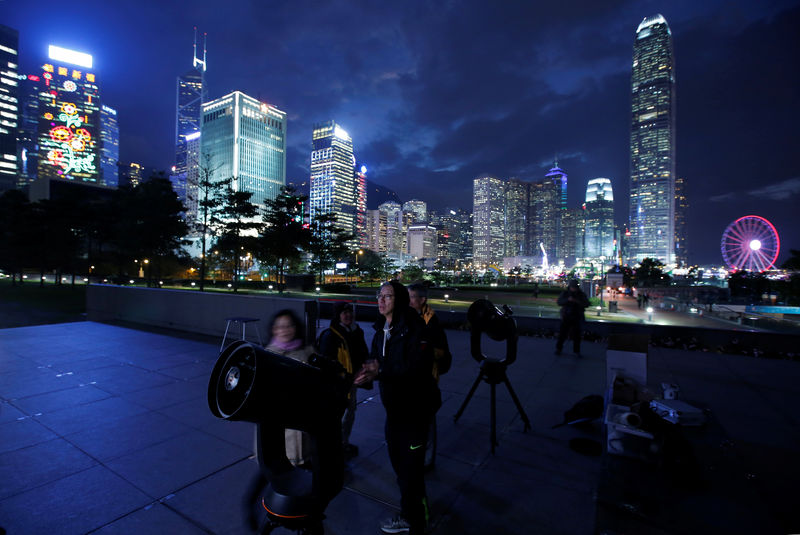By Matthew Miller
BEIJING (Reuters) - More than a year ago, China abruptly shifted from a policy of providing its private conglomerates with cheap cash to push them to become global champions, and tightened capital controls and bank credit.
That seismic shift is still being felt today, as the non-state companies dump property and company stakes, and grapple with developing coherent strategies.
On Monday, Dalian Wanda Group announced it would sell a $1.24 billion stake in Wanda Film Holdings Co (SZ:002739) to Alibaba Group Holding Ltd (N:BABA) and Cultural Investment Holdings Ltd (SS:600715), a Beijing government-backed company.
That followed Wanda's announcement last week that it was shifting a $5.4 billion stake in its property unit to outside investors, led by Tencent Holdings (HK:0700).
For HNA Group, the aviation company that has extended its reach into logistics, tourism and financial services after splashing out $50 billion on dealmaking, the process of deleveraging has just started.
In recent weeks, the company has announced moves to raise billions in funding, including offloading property in Australia and hiring bankers to sell its leading stake in the Spanish hotels company NH Hotel Group SA (MC:NHH).
Last month, at an extraordinary meeting with its major bank creditors, HNA said the company faced a potential cash shortfall of at least $2.4 billion in the first quarter of the year.
Its liquidity problems have extended from overdue aircraft lease payments to a missed early repayment of a 1.7 billion yuan ($268.55 million) trust product.
Other private conglomerates like Fosun International (HK:0656) and Anbang Insurance Group are either reshaping their businesses and reducing debt, or halting fresh buyouts and searching for new shareholders under strict supervision of regulators.
"Some Chinese companies have gone on overseas acquisition binges and now they have too much debt," said Willy Shih, a Harvard Business School professor who has written about Dalian Wanda. He added that it was unclear whether the companies were "looking for re-invention or just trying to put together a business logic that makes sense".
HNA, Wanda and Anbang declined to comment. Fosun did not immediately respond to a request for comment.
CONTROLLING RISK
The Chinese government is trying to control financial sector risk, and has made clear that its crackdown on companies using excessive leverage and short-term funding to buy offshore assets, especially in non-strategic sectors like property and sports, is set to continue.
The country's banking regulator last month said the reduction of corporate debt was a top priority. The China Banking Regulatory Commission (CBRC) also said it would move to clean up financial holding companies and dispose of high-risk institutions.
"A reset is a good way of describing what is going on," said Hernan Cristerna, global co-head of M&A at JP Morgan Chase (NYSE:JPM) & Co.
"The behavior of some - not all - of the companies was not entirely aligned with the industrial, dependable and cooperative approach that China wants to establish in the global arena."
The CBRC had already targeted Wanda, HNA, Fosun and Anbang last June when it ordered top banks to assess their exposure to offshore acquisitions by those groups, halting some deals and prompting the current round of asset sales.
Other non-state conglomerates have also been under pressure to sell stakes, including Tomorrow Group, with interests in more than 30 domestic financial institutions.
The CBRC did not immediately respond to a request for comment.
KEY TRANSFORMATION
Dalian Wanda's 14 percent equity stake sale in its commercial real estate unit to an investor group that included Tencent, Sunac China Holdings (HK:1918) and JD.com Inc (O:JD), is part of a move by the group's property arm into an operation with fewer assets.
It follows a year of painful sales that included landmark real estate projects in London and Sydney, along with Wanda's $9 billion divestment of much of its domestic hotels and theme parks business.
"The key to Wanda's transformation is the transformation of Wanda Commercial Properties from a heavy-asset enterprise to an enterprise that focuses on light assets," Wang Jianlin said last month. That means more partnerships, fewer self-owned properties, and a significant reduction in corporate debt, Wang said. Last week's deal also is expected to pave the way for the re-listing of Wanda's commercial properties unit, analysts say, and may help Wanda develop an online-offline strategy.
Fosun International, which paid $1.1 billion to buy Club Med and holds stakes in an assortment of lifestyle companies, including AHAVA, an Israeli skincare brand, also has undergone strategic rebranding. Fosun has also moved to strengthen its balance sheet, reduce net debt, and balance its acquisitions with asset sales. It is also looking to diversify risk through more public market listings, including the share sales of its tourism business.
In January, Moody's Investors Service upgraded Fosun's corporate family rating to Ba2, still speculative, citing the firm's "improved business profile" and expectations that the company would maintain current leverage ratios.
The strategic shift by many of the non-state conglomerates has been accidental but necessary, said one senior Asia banker who has worked with some of the companies.
"All these guys thought of themselves as private equity," the banker said. "That mentality is now changing into 'what are the two or three businesses we truly care about and have scale and logic in?'"
